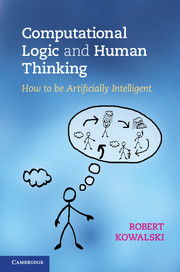Book contents
- Frontmatter
- Contents
- Preface
- Summary and plan of the book
- Introduction
- 1 Logic on the Underground
- 2 The psychology of logic
- 3 The fox and the crow
- 4 Search
- 5 Negation as failure
- 6 How to become a British Citizen
- 7 The louse and the Mars explorer
- 8 Maintenance goals as the driving force of life
- 9 The meaning of life
- 10 Abduction
- 11 The Prisoner’s Dilemma
- 12 Motivations matter
- 13 The changing world
- 14 Logic and objects
- 15 Biconditionals
- 16 Computational Logic and the selection task
- 17 Meta-logic
- Conclusions of the book
- A1 The syntax of logical form
- A2 Truth
- A3 Forward and backward reasoning
- A4 Minimal models and negation
- A5 The resolution rule
- A6 The logic of abductive logic programming
- References
- Index
10 - Abduction
Published online by Cambridge University Press: 07 September 2011
- Frontmatter
- Contents
- Preface
- Summary and plan of the book
- Introduction
- 1 Logic on the Underground
- 2 The psychology of logic
- 3 The fox and the crow
- 4 Search
- 5 Negation as failure
- 6 How to become a British Citizen
- 7 The louse and the Mars explorer
- 8 Maintenance goals as the driving force of life
- 9 The meaning of life
- 10 Abduction
- 11 The Prisoner’s Dilemma
- 12 Motivations matter
- 13 The changing world
- 14 Logic and objects
- 15 Biconditionals
- 16 Computational Logic and the selection task
- 17 Meta-logic
- Conclusions of the book
- A1 The syntax of logical form
- A2 Truth
- A3 Forward and backward reasoning
- A4 Minimal models and negation
- A5 The resolution rule
- A6 The logic of abductive logic programming
- References
- Index
Summary
Most changes in the world pass us by without notice. Our sensory organs and perceptual apparatus filter them out, so they do not clutter our thoughts with irrelevancies. Other changes enter our minds as observations. We reason forward from them to deduce their consequences, and we react to them if necessary. Most of these observations are routine, and our reactions are spontaneous. Many of them do not even make it into our conscious thoughts.
But some observations are not routine: the loud bang in the middle of the night, the pool of blood on the kitchen floor, the blackbird feathers in the pie. They demand explanation. They could have been caused by unobserved events, which might have other, perhaps more serious consequences. The loud bang could be the firing of a gun. The pool of blood could have come from the victim of the shooting. The blackbird feathers in the pie could be an inept attempt to hide the evidence.
- Type
- Chapter
- Information
- Computational Logic and Human ThinkingHow to Be Artificially Intelligent, pp. 134 - 143Publisher: Cambridge University PressPrint publication year: 2011



